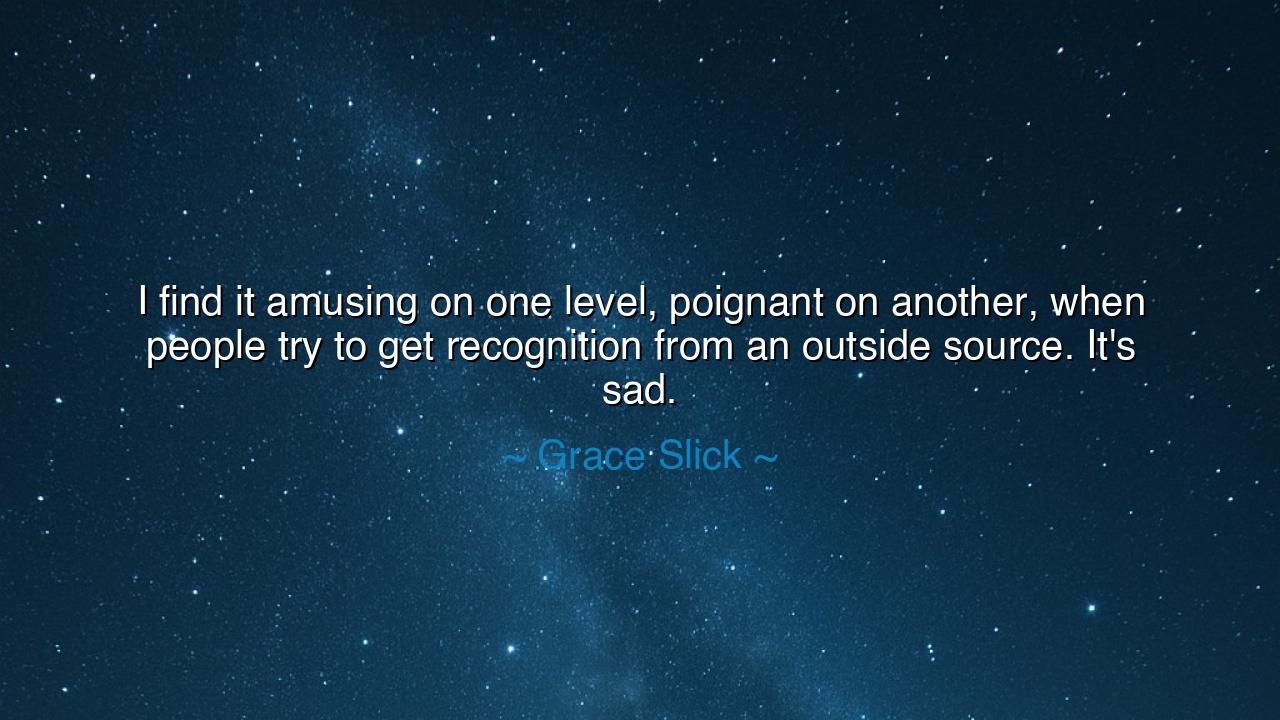
I find it amusing on one level, poignant on another, when people
I find it amusing on one level, poignant on another, when people try to get recognition from an outside source. It's sad.






The words of Grace Slick fall with the sharpness of truth and the tenderness of sorrow: “I find it amusing on one level, poignant on another, when people try to get recognition from an outside source. It’s sad.” In this statement, she reveals one of the oldest struggles of the human spirit—the desire to be seen, praised, and affirmed by others, even at the cost of one’s own peace. To her, there is both humor and tragedy in this pursuit, for it shows how fragile the human heart can be when it places its worth in the hands of strangers.
The origin of these words lies in Slick’s life as a rock icon. She lived in the whirlwind of fame, applause, and public attention, and she knew its hollow center. When the crowd cheers, it feels like eternity—but when the lights dim, and the noise fades, the hunger for validation often returns, sharper than before. Having walked through both the ecstasy of recognition and the emptiness behind it, she could see clearly that the search for outside recognition is often a trap, one that leaves people restless and unsatisfied.
The ancients knew this well. The Stoic philosopher Marcus Aurelius wrote in his Meditations: “It never ceases to amaze me: we all love ourselves more than other people, but care more about their opinion than our own.” Here is the same truth that Slick names. To seek recognition from outside sources is to surrender our sovereignty, to place our value in the shifting winds of opinion. It is, as she says, sad, because it betrays the power of the self, exchanging inner strength for outer approval.
History offers us vivid examples. Consider Vincent van Gogh, who in his life was barely recognized, selling only a handful of paintings. He suffered deeply from the lack of recognition, yearning for approval from a world that overlooked him. Yet, though he died in obscurity, his art later shook the world with its brilliance. His story reminds us that the worth of a person or their work is not determined by applause, but by the truth and passion that flow from within. Had van Gogh rested his value only on external praise, his art might never have been born.
There is also a kind of poignancy in this struggle. The longing for recognition is not simply vanity—it is the yearning of the human heart to be known, to be understood. In this sense, it is a deeply human impulse, and we must look upon it with compassion. But when that longing becomes dependence, when the soul cannot stand without external affirmation, then it becomes chains. Grace Slick saw this and could laugh at its absurdity while grieving its cost.
The lesson for us is this: do not anchor your worth in the eyes of others. Recognition may come and go, but it is never steady, never enough. Instead, root yourself in your own truth, in the integrity of your work, in the depth of your spirit. The applause of others can be pleasant, but it is fleeting. The recognition of your own conscience, however, is eternal.
Practical action lies before us: practice gratitude for your own efforts without waiting for others to notice. Create, work, and live not for applause, but for the joy of aligning your actions with your values. When recognition comes, accept it humbly, but when it does not, do not let your spirit be shaken. And when you see others enslaved by the hunger for validation, encourage them gently to see their own worth.
So let us remember Grace Slick’s wisdom: the pursuit of outside recognition is both amusing and sad, for it blinds us to the power of self-recognition. Live so that your worth is not a question of applause, but a certainty rooted in the truth of who you are. For the soul that knows its own value cannot be shaken by silence, nor intoxicated by praise—it is free.






AAdministratorAdministrator
Welcome, honored guests. Please leave a comment, we will respond soon